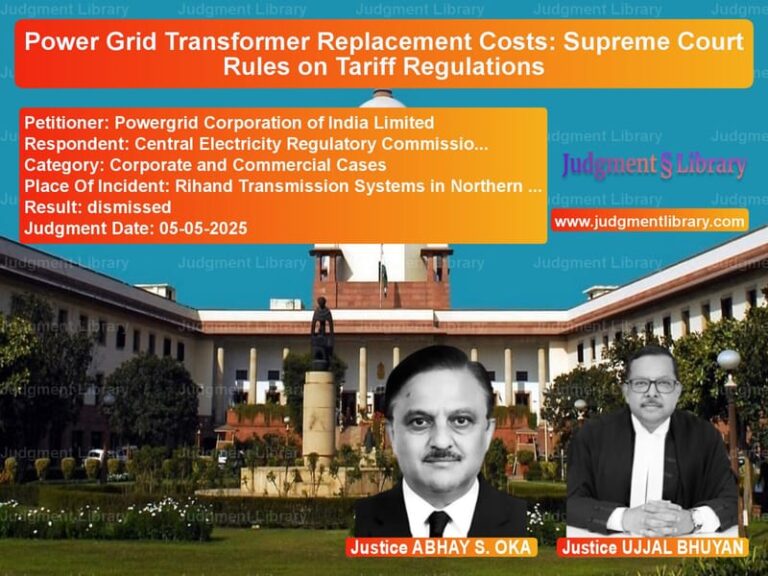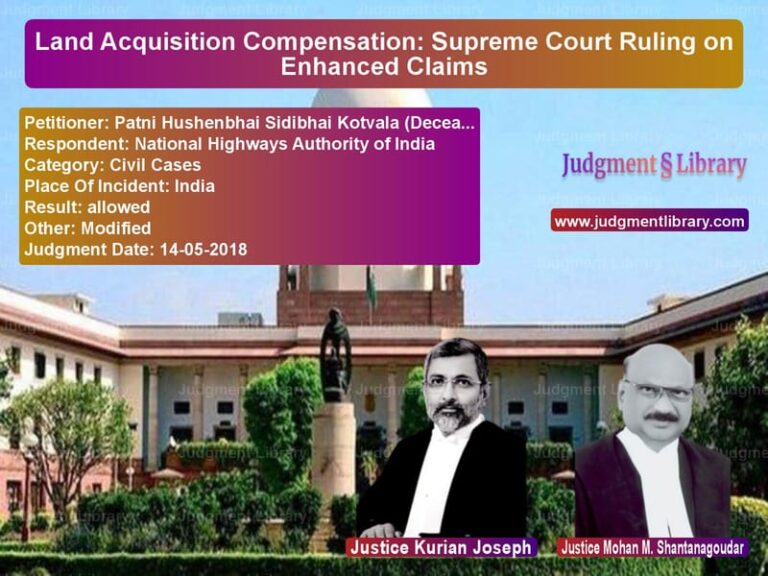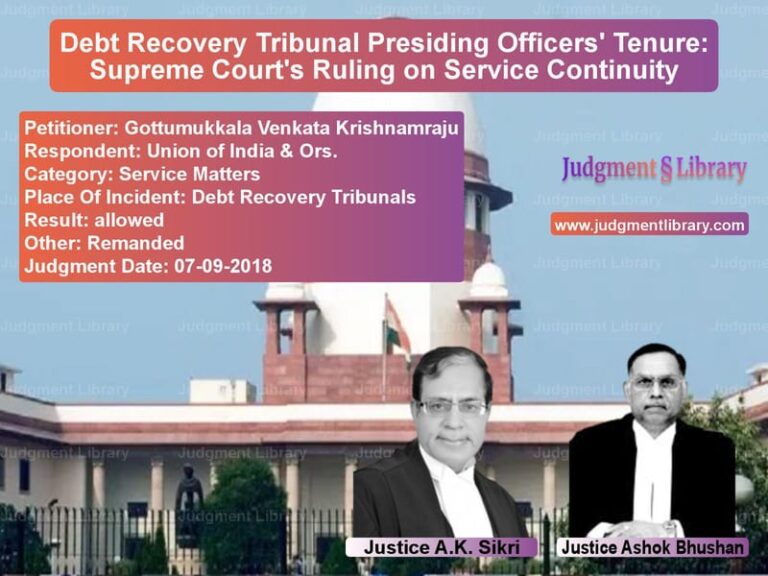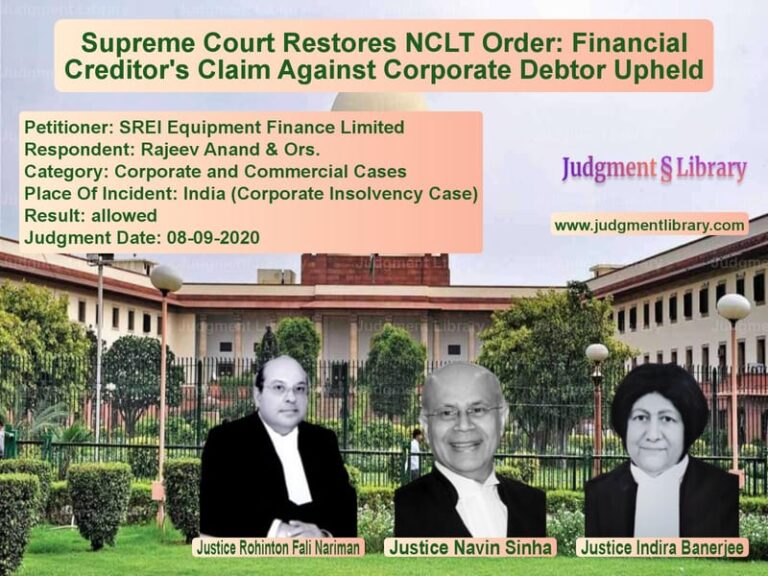Supreme Court Clarifies Excise Duty Valuation: Understanding ‘Transaction Value’ Under Section 4
The Supreme Court of India, on May 11, 2018, delivered a landmark ruling in the case of Commissioner of Central Excise, Indore vs. M/s Grasim Industries Ltd., which clarified the scope of ‘transaction value’ under Section 4 of the Central Excise Act, 1944. The judgment resolved a long-standing dispute regarding whether additional charges such as packing, wear and tear, facility, service, rental, and testing charges should be included in the assessable value for excise duty.
The ruling set a precedent by explaining how excise duty should be calculated and provided much-needed clarity on whether various ancillary charges should be factored into the tax base for manufacturing goods.
Background of the Case
The respondent, M/s Grasim Industries Ltd., along with other assessees, manufactured industrial gases, liquid chlorine, and other allied products. These goods were supplied to customers using various containers such as tonners, cylinders, and carboys. In some cases, the assessees provided containers on rent, while in other cases, customers brought their own containers. The assessees charged additional amounts for services such as packing, wear and tear, facility maintenance, delivery, and testing.
The core legal question in the case was whether these additional charges should be considered part of the assessable value of the goods for excise duty calculations. The excise authorities argued that all charges incurred up to the clearance of goods should be included in the transaction value, whereas the assessees contended that these were independent commercial activities and should not be included in the duty valuation.
Legal Questions Considered
- Does the definition of ‘transaction value’ under Section 4 of the Central Excise Act, as amended in 2000, include additional charges incurred by the manufacturer?
- Should Sections 3 and 4 be treated as interdependent or separate in defining excise duty valuation?
- Does the introduction of ‘transaction value’ represent a departure from the previous ‘normal price’ standard?
Petitioner’s Arguments
The tax authorities, led by the Commissioner of Central Excise, Indore, contended that excise duty should be levied on the entire value of goods, including ancillary charges, up to the point of clearance. They argued that the 2000 amendment to Section 4 was meant to broaden the scope of valuation, ensuring that excise duty captures the full economic value of goods.
The petitioner relied on the ruling in Union of India vs. Bombay Tyre International Ltd., which stated that any component that enriches the value of a product before clearance should be included in the excise duty calculation. They emphasized:
“So long as a reasonable nexus exists between the measure of the levy and its nature, Sections 3 and 4 operate independently. The amendments in 2000 did not change the fundamental basis of excise duty but clarified the inclusions under transaction value.”
Respondent’s Arguments
M/s Grasim Industries Ltd. and other assessees argued that excise duty should only be applicable to the manufacturing cost and profit. They contended that post-manufacturing expenses such as transportation, testing, and packaging should not be included in the excise valuation.
They relied on the ruling in Commissioner of Central Excise, Pondicherry vs. Acer India Ltd., where the Court held that software bundled with computer hardware should not be included in the assessable value of the hardware. They argued that their additional charges were separate commercial transactions and not part of the manufacturing process.
Supreme Court’s Observations
The Court examined the legal framework of excise duty and its computation under Section 4. The bench ruled that excise duty is a tax on manufacture, but the valuation process is a statutory function. It held:
“The levy of a tax is defined by its nature, while the measure of the tax may be assessed by its own standard. A broader-based standard may be adopted if it maintains a nexus with the essential character of the levy.”
The Court clarified that transaction value under Section 4 includes all costs up to the stage of clearance of goods, reaffirming the principles laid down in Bombay Tyre International Ltd. The Court also ruled that the interpretation in Acer India Ltd. was specific to its facts and did not apply to this case.
Key Takeaways from the Judgment
- Manufacturers must include all costs incurred up to the point of clearance in the transaction value for excise duty.
- Tax authorities now have a clearer framework for assessing excise duty.
- Industries may need to modify their pricing structures to comply with this ruling.
- The judgment aligns excise duty calculations with broader indirect tax frameworks such as GST.
Final Judgment
The Supreme Court ruled in favor of the Commissioner of Central Excise, Indore, stating:
“Transaction value under Section 4(3)(d) of the Act encompasses all value additions made to the manufactured article prior to its clearance, as long as they enrich the product and facilitate its sale.”
Thus, the appeal of the Commissioner of Central Excise was allowed, reaffirming the ruling in Bombay Tyre International Ltd. as the correct interpretation of the law.
The decision ensures greater transparency in excise duty calculations, reducing ambiguity in tax assessments. The ruling is expected to serve as a guiding principle for future taxation disputes involving excise duty valuation.
Petitioner Name: Commissioner of Central Excise, Indore.Respondent Name: M/s Grasim Industries Ltd..Judgment By: Justice Ranjan Gogoi, Justice N.V. Ramana, Justice R. Banumathi, Justice Mohan M. Shantanagoudar, Justice S. Abdul Nazeer.Place Of Incident: Indore, Madhya Pradesh.Judgment Date: 10-05-2018.
Don’t miss out on the full details! Download the complete judgment in PDF format below and gain valuable insights instantly!
Download Judgment: Commissioner of Cent vs Ms Grasim Industrie Supreme Court of India Judgment Dated 10-05-2018.pdf
Direct Downlaod Judgment: Direct downlaod this Judgment
See all petitions in Income Tax Disputes
See all petitions in GST Law
See all petitions in Tax Evasion Cases
See all petitions in Judgment by Ranjan Gogoi
See all petitions in Judgment by N.V. Ramana
See all petitions in Judgment by R. Banumathi
See all petitions in Judgment by Mohan M. Shantanagoudar
See all petitions in Judgment by S. Abdul Nazeer
See all petitions in allowed
See all petitions in supreme court of India judgments May 2018
See all petitions in 2018 judgments
See all posts in Taxation and Financial Cases Category
See all allowed petitions in Taxation and Financial Cases Category
See all Dismissed petitions in Taxation and Financial Cases Category
See all partially allowed petitions in Taxation and Financial Cases Category







